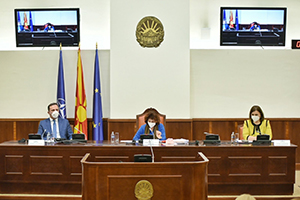 Tuesday, 15 December 2020
Tuesday, 15 December 2020
VIOLENCE IS A TOPIC THAT DOES NOT RECOGNIZE POLITICAL, PARTY, EDUCATIONAL, INTELLECTUAL OR RELIGIOUS AFFILIATION, IT CONCERNS EVERYONE
The Committee on Equal Opportunities for Women and Men of the Assembly, today had a public hearing on the topic: Draft-Law on Prevention and Protection from Violence against Women and Domestic Violence. The public discussion was organized upon the initiative of the Association for Gender Equality ONE CAN.
In the public discussion addressed Jagoda Shahpaska, Minister of Labor and Social Policy and Oliver Spasovski, Minister of Internal Affairs; and then also addressed Marta Markovska, adviser at the Institute for Social Activities – Skopje; Doroti Packova from the Association for Gender Equality ONE CAN! And Elena Dimushevska from the National Network to end Violence against Women and Domestic Violence.
The Chair of the Committee on Equal Opportunities for Women and Men, Gordana Siljanovska – Davkova summarized the remarks. She underlined that the law should incorporate a provision for post-legislative oversight, three years after the adoption the legal solution and thus to monitor the implementations in order to avoid the impression of preferring declarations which seem much more poetic, but each law should be evaluated on time. Furthermore, According to her, the provision that this law does not cause financial consequences, is a great illusion and does not represent a responsible behavior towards the law. Regarding the national coordinating body for implementation of the Convention, she underlined that its composition should be reconsidered and as the most qualified should instruct the University, i.e. persons who deal with the topic, teach and are part of governmental staff.
The Minister of Labor and Social Policy, Jagoda Shahpaska underlined that violence is a topic that does not recognize political and party affiliation, or educational, intellectual or religious affiliation, it affects everyone. She emphasized that in order to provide appropriate response it is required the implementation of the comprehensive policy in the fight of violence against women. This law gives a comprehensive approach, i.e. integrated multidiscipline response in dealing with violence on women and domestic violence, respecting human rights in accordance with the international standards.
The Minister of Internal Affairs, Oliver Spasovski stated that the law should enable the establishment of a standardized network of institutions that will guarantee a set of services for protection from domestic violence. According to him, the intervention of the police should remain within the framework of the principles defined by the Law on Prevention and Protection from Violence against Women and Domestic Violence, and in accordance with the powers defined in the Law on Police, while emphasizing the importance of the introduces principle of “due diligence”, that will significantly impact on the action of institutions, including the police.
Marta Markosa underlined that the Institute for Social Activity, in terms of consistent implementation of this law with continue to provide a constant strengthening of the capacities of professional workers in the system of social protection for the gender concept in accordance with the Program for Continuous Education of Professional Workers in Institutions for Social Protection, among whom also the providers of services for specialized services for gender based violence, prepared by the Institute for Social Activities and their licensing.
Doroti Packova initially reflected the need for the coordinating body to be led by experts in gender equality, then, regarding the services she pointed out that they should refer to specialized categories of contextual victims of gender based violence, i.e. subcategories of women victims and at the end stated that “vulnerability” should be defined as predetermined or acquired in certain cases, and as socially created vulnerability in other cases, such as single mothers.
Elena Dimushevska focused on reintegration of women victims of violence after they will leave the violent environment. Namely, for the first time our legislation recognizes the significance of providing support in the process of reintegration of women victims. It includes support for housing, psychological support, trainings, education, as well as assistance in employment, in order to achieve economic strengthening of women victims and their financial independence, and thus preventing the victim to return in the house of the perpetrator. But, it does not foresee which institution will provide finances for this program to be implemented. Furthermore, she recommended definition of the forms of violence against women in particular articles of the legal text and emphasized the need to foresee a shelter for victims of domestic violence regardless their sex, gender, age and kinship with the perpetrator.
In the discussion also participated the MPs Maja Moracanin, Snezhana Kaleska – Vanceva and Fisnike Bekteshi – Shaqiri, as well as the representatives from the civil sector: Suzana Stojanovska from the Day Center Dose of Happiness, Mersiha Smailovikj from the NGO Legis, Nade Kacakova – activist for women rights, Stojanka Mirceva from the Faculty of Security, Elizabeta Bozhinovska from HERA and the lawyer Biljana Andonova.